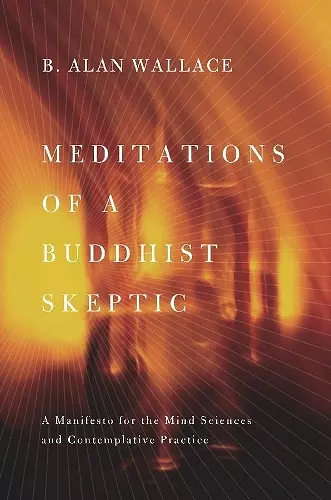Meditations of a Buddhist Skeptic
A Manifesto for the Mind Sciences and Contemplative Practice
Format:Hardback
Publisher:Columbia University Press
Published:9th Dec '11
Currently unavailable, and unfortunately no date known when it will be back

Renowned Buddhist philosopher B. Alan Wallace reasserts the power of shamatha and vipashyana, traditional Buddhist meditations, to clarify the mind's role in the natural world. Wallace challenges the claim that consciousness is nothing more than an emergent property of the brain with little relation to universal events. Rather, he maintains that the observer is essential to measuring quantum systems and that mental phenomena (however conceived) influence brain function and behavior. Wallace embarks on a two-part mission: to restore human nature, and then to transcend it. He begins by illustrating the value of skepticism in Buddhism and science and the difficulty of merging their experiential methods of inquiry. Yet Wallace also proves that Buddhist views on human nature and the possibility of free can liberate us from the metaphysical constraints of scientific materialism. He also explores the radical empiricism inspired by William James, applying it to Indian Buddhist philosophy's four schools and the Great Perfection school of Tibetan Buddhism. He concludes with an explanation of shamatha and vipashyana and their capacity? for realizing the full nature, origins, and potential of consciousness.
A radical approach to studying the mind. Renowned Buddhist philosopher B. Alan Wallace reasserts the power of shamatha and vipashyana, traditional Buddhist meditations, to clarify the mind's role in the natural world. Raising profound questions about human nature, free will, and experience versus dogma, Wallace challenges the claim that consciousness is nothing more than an emergent property of the brain with little relation to universal events. Rather, he maintains that the observer is essential to measuring quantum systems and that mental phenomena (however conceived) influence brain function and behavior. Wallace embarks on a two-part mission: to restore human nature and to transcend it. He begins by explaining the value of skepticism in Buddhism and science and the difficulty of merging their experiential methods of inquiry. Yet Wallace also proves that Buddhist views on human nature and the possibility of free will liberate us from the metaphysical constraints of scientific materialism. He then explores the radical empiricism inspired by William James and applies it to Indian Buddhist philosophy's four schools and the Great Perfection school of Tibetan Buddhism. Since Buddhism begins with the assertion that ignorance lies at the root of all suffering and that the path to freedom is reached through knowledge, Buddhist practice can be viewed as a progression from agnosticism (not knowing) to gnosticism (knowing), acquired through the maintenance of exceptional mental health, mindfulness, and introspection. Wallace discusses these topics in detail, identifying similarities and differences between scientific and Buddhist understanding, and he concludes with an explanation of shamatha and vipashyana and their potential for realizing the full nature, origins, and potential of consciousness.
The suggestion brought to the fore by Flanagan and Wallace-that Buddhism may be a source of insight in these areas-is a welcome and tantalizing one. -- Daniel Stoljar Nature This book is a stirring attack on the hubris and blind spots of the scientific establishment, combined with an engaging presentation of Buddhist wisdom as the antidote. -- Joseph S. O'Leary Japan Times
ISBN: 9780231158343
Dimensions: unknown
Weight: unknown
304 pages